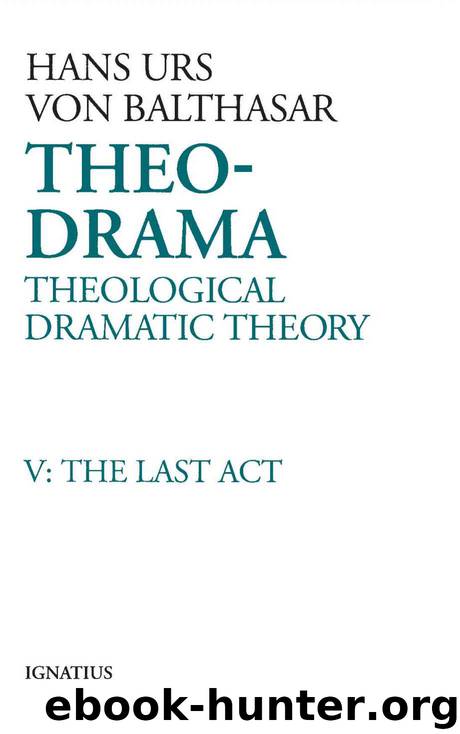Theo-Drama, Vol. 5: The Last Act by Hans Urs von Balthasar

Author:Hans Urs von Balthasar
Language: eng
Format: mobi
Tags: Spiritual & Religion
ISBN: 9780898706895
Publisher: Ignatius Press
Published: 2003-03-02T16:00:00+00:00
2. The One judgment
a. Judgment Universal and Personal
The Bible, both Old and New Testaments, knows of only one Judgment, just as there is only one Day of Yahweh or of Christ. This Judgment will assess the weight that the various historical entities have in the sight of God. First to be judged are the nations that are Israel’s enemies. For God and his justice are on Israel’s side, which means that Israel’s enemies are in the wrong. Egypt must be judged because of its arrogance and its enslaving of Israel (Gen 15:14; Ex 3:16; 4:31; 12:12, and so on). Amalek (Ex 17:14), the Amoritcs (Nb 21:34), Midian (Nb 31:3) and the Canaanitcs (Josh 8:14; 11:20, and so on) must be judged for having opposed Israel’s entry into the Promised Land. Later, in the time of the Prophets, there are all those who threatened Israel: they are all mentioned in oracles of judgment (cf., for example, Amos 1-2; Jer 25:14ff.; 46-51; Ezek 25-32). They are judged as collective persons, often (as in Ezekiel) embodied by their prince: Pharaoh, the King of Tyre, the King of Babylon, and so on.
When we come to Amos, the picture of the “Day of the Lord” changes. Now light is no longer reserved for Israel: the darkness will apply to Israel as well. Thus Yahweh’s storm falls upon Israel (Amos 2:4-6:14). Now Israel, treated as a person, as God’s first-beloved (Hos 2; Jer 2:2; 11:15), can be compared to other “persons” at the Day of Judgment, for example, “your sister Sodom with her daughters”, “your elder sister Samaria”: these “have not committed half your sins” (Ezek 16:46-51; cf. Ezek 23 and Mt 11:20-24). The fact that God’s people, in its entirety, appears here as a person is ultimately a consequence of the Covenant: the legal covenant is no longer concluded with individuals (like the patriarchs) but with the people as a whole (Ex 15:25), which solemnly promises to keep it (Josh 24). Initially the promises and threats for keeping or infringing the law are addressed to the whole people (Lev 26; Dt 28), just as the fourfold sequence—falling away, punishment, crying to God, salvation—applies (from the Book of Judges onward) to the whole people. Of course, right from the beginning there were individual righteous men and individual transgressors within the nation, attracting individual reward and punishment (Onan: Gen 38:10; Nadab: Lev 10:2, and so on, and later even kings who were punished in their tribe: Eli: 1 Sam 3:13; David: 2 Sam 12:14; Solomon: 1 Kings 11:12; Jeroboam: 14:10-12; Ahab: 21:29, and so on). They serve as admonitory examples to the whole people. In the Prophets the guilty persons coalesce into groups: there are the idolaters, the oppressors of the poor, the false prophets; and their sin is such a burden that it plunges the entire people into calamity. The situation is so disastrous that God’s judgment is almost ready to abolish the Covenant (Is 9:8-10:4; Jer 4:5-31); appeals are to no avail: “Though Moses and Samuel stood before me, yet my heart would not turn toward this people.
Download
This site does not store any files on its server. We only index and link to content provided by other sites. Please contact the content providers to delete copyright contents if any and email us, we'll remove relevant links or contents immediately.
The Lost Art of Listening by Michael P. Nichols(7506)
Why I Am Not A Calvinist by Dr. Peter S. Ruckman(4153)
The Rosicrucians by Christopher McIntosh(3521)
Wicca: a guide for the solitary practitioner by Scott Cunningham(3179)
Signature in the Cell: DNA and the Evidence for Intelligent Design by Stephen C. Meyer(3138)
Real Sex by Lauren F. Winner(3023)
The Holy Spirit by Billy Graham(2953)
To Light a Sacred Flame by Silver RavenWolf(2823)
The End of Faith by Sam Harris(2742)
The Gnostic Gospels by Pagels Elaine(2531)
Waking Up by Sam Harris(2461)
Nine Parts of Desire by Geraldine Brooks(2369)
Jesus by Paul Johnson(2362)
Devil, The by Almond Philip C(2332)
The God delusion by Richard Dawkins(2309)
Heavens on Earth by Michael Shermer(2284)
Kundalini by Gopi Krishna(2185)
Chosen by God by R. C. Sproul(2164)
The Nature of Consciousness by Rupert Spira(2108)
